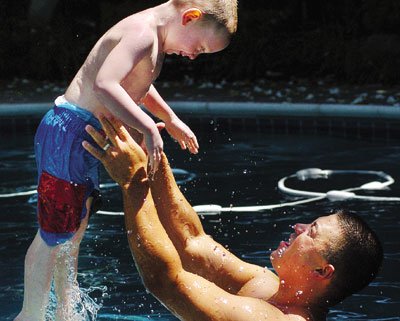Most parents are more worried about filling the remaining days
of kids’ summer than the first day of school. But parents of
autistic children have been fretting for months.
Gilroy – Most parents are more worried about filling the remaining days of kids’ summer than the first day of school. But parents of autistic children have been fretting for months.
With less than two months before schools reopen their doors, parents of autistic children are uncertain whether their children will be put into a class specially geared toward the disability. While parents have been given verbal assurance of a special class by Gilroy Unified School District Director of Student Services Marcia Brown, they are concerned that the lack of written confirmation and Brown’s August retirement means the class will not materialize.
“When my son is in that classroom, that is when I will be happy,” said Tiffany Thomas, whose 5-year-old, J.J., has a mild case of autism and will enter district education next year.
Thomas, other parents of autistic children and educators see a need for a class dedicated to teaching autistic children, which number about 1 in 150 students nationwide and would make for about 70 in the district. Autistic children typically do not recognize facial expressions, develop language on pace with typical children, make eye contact or express themselves clearly through words or gestures. As a result, they have a hard time interacting with teachers and other students, especially in younger years as language skills develop.
In the past, the district has placed autistic students in classes with other special-education students from kindergarten through third grade. These students vary widely in age and disability.
“You have 13 different (measures of ability), 13 different lesson plans but you have one teacher,” Thomas said. “Just thinking about it, it doesn’t make any sense.”
Autistic children need a highly-structured, active day to help them develop social skills and verbal abilities, said Adrienne Summers, who has taught special education in the district for eight years. Small classes of about 12 students or less specially geared to kids with the disease can effect large gains in abilities and help kids function in school and society at a higher level, she said. But current class configurations do not allow this type of individualized attention.
“These kids are square kids and we’re trying to fit them into round holes,” Summers said. “If these kids are not going to fit our education program, we’re going to have to change our education program.”
The district agreed to make a change to its education program, creating an all-autistic class for kindergartners and first-graders, in early June only after Thomas threatened to sue because her son would not get the adequate education he was guaranteed by federal law. She made the threat after she and Angela Perryman, a parent of a 6-year-old with moderate autism, attempted for more than two months to reach five administrators and district staff through phone calls and e-mails with no response.
The class, which will have eight students, would likely cost more than $100,000 in staff salary, about the same as a typical special education class, and would reduce staff needs for other special education classes. However, the class would be less expensive than busing students to another district and paying for their education there, as required by federal law if the district education is determined to be inadequate. The district already pays about $1.2 million each year, or nearly $14,000 per student, just to bus the 88 special education students that already take advantage of this provision.
In addition, the parents and Summers see implementing autism-only classes as an opportunity for Gilroy to become a leader in the field. The district could absorb students, and increase the state funding it receives from districts that do not have autism only classes. Already, parents have come to South Valley from as far away as Georgia because educators in the Valley are better trained in working with the disease, Summers said.
Thomas and Perryman, initially buoyed by Brown’s announcement of a new all-autistic class, have become worried as they have not received written confirmation.
Brown backed out of a meeting with the Dispatch and did not return multiple messages left during a three-week span.
This unresponsiveness has been characteristic of the parents’ struggle to get what they perceive to be the proper education for their children.
“You’re always waiting for them to yank service away and leave you hanging,” Perryman said.
However, the district is remiss if it believes silence will deter them, she added.
“In my mind, promises were made.”















